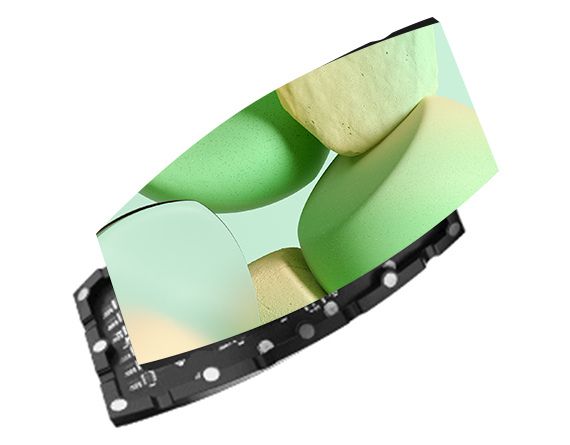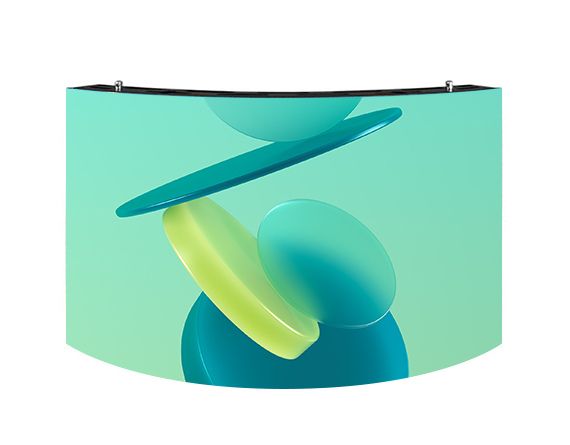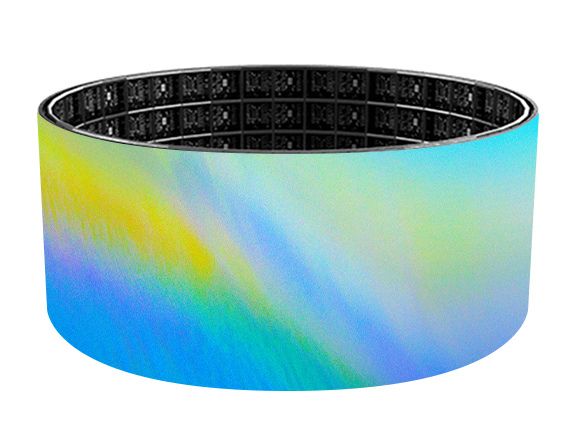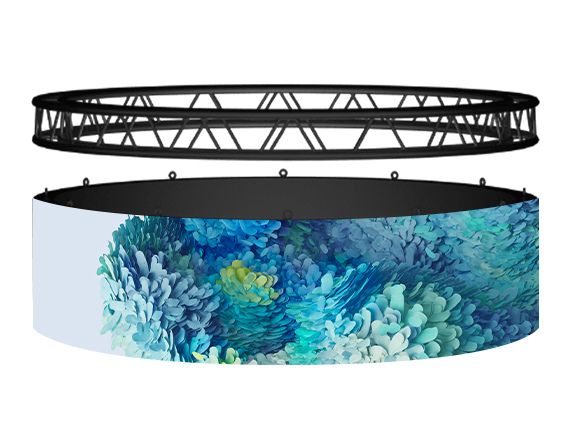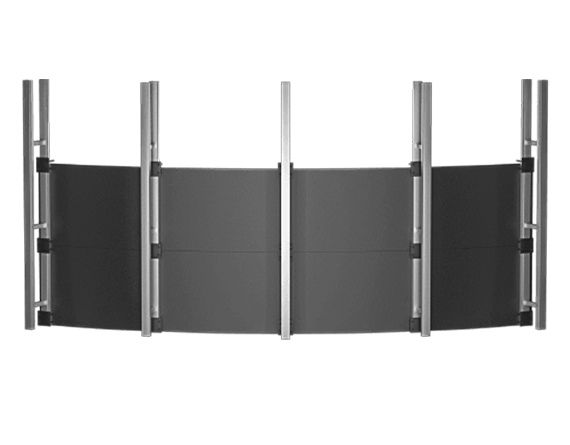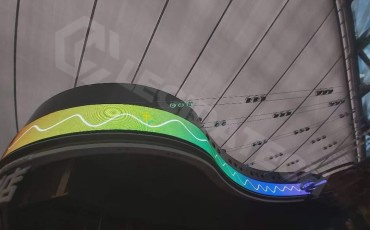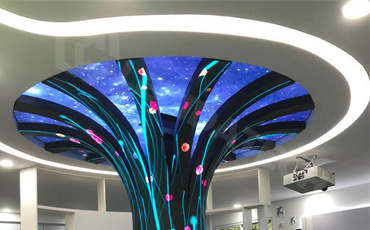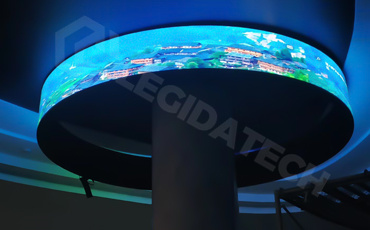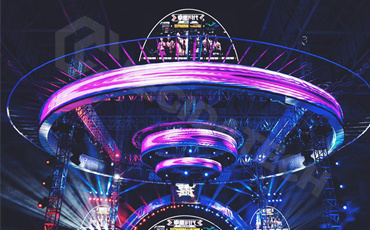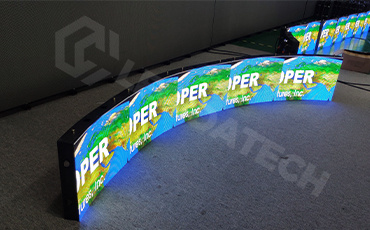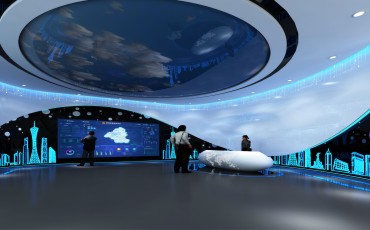Soft Flexible LED display Module
- Best Color uniformity.
- Ultra thin, Ultra Light Weight with any shapes any angles can be designed.
- Module with small unit and flexible design to do more complicated shapes for the video show.
- Easy assemble and disassemble with soft led modules directly. saving time and labor cost.
- Easy installation soft LED module with magnet connection
Flexible LED Display Description
Flexible LED screens, also known as flexible display panels, have become increasingly popular in various industries due to their features and advantages.
These screens are made flexible materials, such as thin plastic substrates, that allow them to be bent, folded, and curved without affecting their functionality.

Flexibility
As the name suggests, the main advantage of flexible LED screens is their flexibility. Unlike traditional LED screens, which are rigid limited in shape, flexible screens can be easily curved and shaped to fit any contour or design.
This flexibility opens up endless possibilities in terms of product design and application, allowing for more creative and visually engaging displays.

Lightweight and Thinness
Another advantage of flexible LED screens is their lightweight nature. The thin and flexible materials make them significantly lighter than traditional LED screens. This lightweight design not only simplifies installation but also reduces transportation costs and energy consumption.
Flexible LED screens have a remarkably thin profile, making them ideal for applications where space is limited. They can be easily incorporated into various products without adding excessive bulk or weight. This thinness also enhances their visual appeal, allowing for sleek and seamless integration into different environments and designs.

Dynamic content
LED screens offer wide viewing angles, ensuring that the content displayed can be seen clearly from various perspectives. This is particularly beneficial in applications where the screens need to reach a large audience, such as in stadiums or exhibition halls.
Besides, with the flexibility to create curved or multi-panel displays, businesses can create captivating visual experiences that capture attention and deliver impactful messaging. This dynamic content capability can greatly enhance brand awareness and customer engagement.
Customizable
Flexible LED screens can be customized to suit specific design requirements. They can be made in various sizes, shapes,, enabling businesses to create tailored solutions for their unique needs. This customization ensures that the display can seamlessly integrate into existing designs and environments, enhancing the overall visual experience.
Flexible LED screens offer versatile applications across different industries. They can be used for indoor and outdoor advertising, retail display signage, stadium displays, stage designs, automotive displays, and much more. This versatility makes flexible LED screens a popular choice for businesses looking to create impactful and dynamic visual experiences.

Seamless assembly
Flexible LED screens feature a modular design that allows for seamless assembly and scalability. The panels can be easily connected and disconnected, creating larger displays as needed. This modular design also enables easy maintenance and replacement of individual units, reducing downtime and repair costs.

Flexible LED Module Parameters
- Shaped screen
| Model | SLS-P1.875 | SLS-P2 | SLS-P2.5 | SLS-P3 | SLS-P4 |
| Pixel Pitch | 1.875 mm | 2 mm | 2.5 mm | 3 mm | 4 mm |
| LED Type | SMD1515 | SMD1515 | SMD1515 | SMD2121 | SMD2121 |
| Configuration | 1R1G1B | 1R1G1B | 1R1G1B | 1R1G1B | 1R1G1B |
| Module Size | 240*120 mm | 240*120/256*128mm | 240*120 /320*160mm | 240*120 mm | 256*128mm |
| Pixel Density | 284444 pixel/㎡ | 250000 pixel/㎡ | 160000 pixel/㎡ | 111111pixel/㎡ | 62500pixel/㎡ |
| Refresh Rate | ≥ 3940Hz | ≥ 3840Hz | ≥ 1920Hz | ≥ 1920Hz | ≥ 1920Hz |
| Gray Scale | 14 Bit | 14 Bit | 14 Bit | 14 Bit | 14 Bit |
| Brightness | ≥ 600 cd/㎡ | ≥ 600 cd/㎡ | ≥ 600 cd/㎡ | ≥ 600 cd/㎡ | ≥ 600 cd/㎡ |
| Scan Way | 1/32 | 1/30 | 1/24 | 1/20 | 1/16 |
| Frame Rate | 50HZ~60HZ | 50HZ~60HZ | 50HZ~60HZ | 50HZ~60HZ | 50HZ~60HZ |
| Viewing Angle | H:140°, V:140° | H:140°, V:140° | H:140°, V:140° | H:140°, V:140° | H:140°, V:140° |
| Max.Current | 3A/Panel | 3A/Panel | 3A/Panel | 3A/Panel | 3A/Panel |
| Avg.Power Consumption | 15W/Panel | 15W/Panel | 15W/Panel | 15W/Panel | 15W/Panel |
| Control System | Nova/Linsn | Nova/Linsn | Nova/Linsn | Nova/Linsn | Nova/Linsn |
| Operation System | Windows XP/7/10 | Windows XP/7/10 | Windows XP/7/10 | Windows XP/7/10 | Windows XP/7/10 |
| Working-Temperature | -20℃~60℃ | -20℃~60℃ | ‘-20℃~60℃ | -20℃~60℃ | -20℃~60℃ |
| Working Humidity | 10%~90% RH | 10%~90% RH | 10%~90% RH | 10%~90% RH | 10%~90% RH |
| Input Voltage | 5V DC input | 5V DC input | 5V DC input | 5V DC input | 5V DC input |
| Data Input | Hub75D (IDC16) | Hub75D(IDC16) | Hub75D(IDC16) | Hub75D(IDC16) | Hub75D(IDC16) |
| MTBF | 35000 Hour | 35000 Hour | 35000 Hour | 35000 Hour | 35000 Hour |
| Lifespan | 100000 Hour | 100000 Hour | 100000 Hour | 100000 Hour | 100000 Hour |
| Certification | CCC,CE,RoHs,ETL | CCC,CE,RoHs,ETL | CCC,CE,RoHs,ETL | CCC,CE,RoHs,ETL | CCC,CE,RoHs,ETL |
Information available for reference and download
How are LED soft modules installed?
Installing LED soft modules can vary depending on the specific design and application. In general, modular led screen can be attached to a structure using adhesive backing, screws, or magnetic fasteners. The modules are typically interconnected through a daisy-chain configuration, where power and data signals are passed from one to another. For outdoor installations, additional weatherproofing measures are necessary, including the use of protective casings or enclosures to shield the modules from environmental factors.
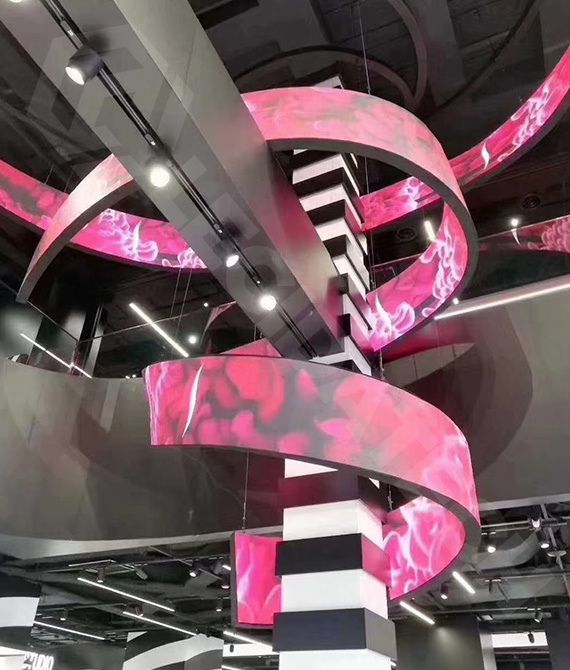
More cases and projects solutions of LEGIDATECH
An LED soft module refers to a flexible LED panel that consists of numerous small LED lights. The module is usually made with a soft, bendable material such as rubber or silicone, allowing it to be shaped into various forms. These modules are commonly used in indoor and outdoor advertising, stage design, architectural lighting, and other applications that require creative and flexible display options.
LED soft modules differ from traditional LED displays in terms of flexibility and adaptability. Unlike rigid LED panels, soft modules can be shaped to fit curved surfaces or irregular shapes, offering more design possibilities. Additionally, soft modules are lightweight and thin, making them easier transport. Traditional LED displays are typically rigid, heavier, and more cumbersome to handle.
LED soft modules offer several advantages. Firstly, Modular LED screen provide a more display due to their flexibility, allowing for smoother and curved designs. Secondly, they are lightweight, making them easier to mount or hang. Thirdly, they consume less power compared to traditional LED displays, resulting in lower energy costs. Lastly, LED soft modules are easy to maintain and repair, as individual units can be replaced without affecting the entire display.
Yes, most LED soft modules are designed to be weatherproof and can withstand different weather conditions. They are often made with durable and waterproof materials that can resist rain, dust, and other outdoor elements. However, it is essential to choose modules specifically rated for outdoor use and ensure proper installation and sealing to guarantee the longevity of the display.
LED soft modules can be controlled through various methods. The most common method is using a controller or software that communicates with the modules via a data cable or wireless connection. These controllers enable users to adjust brightness, color, and display patterns, as well as create dynamic effects and animations. Additionally, advanced control systems may provide features such as remote monitoring and scheduling to automate display content management.




